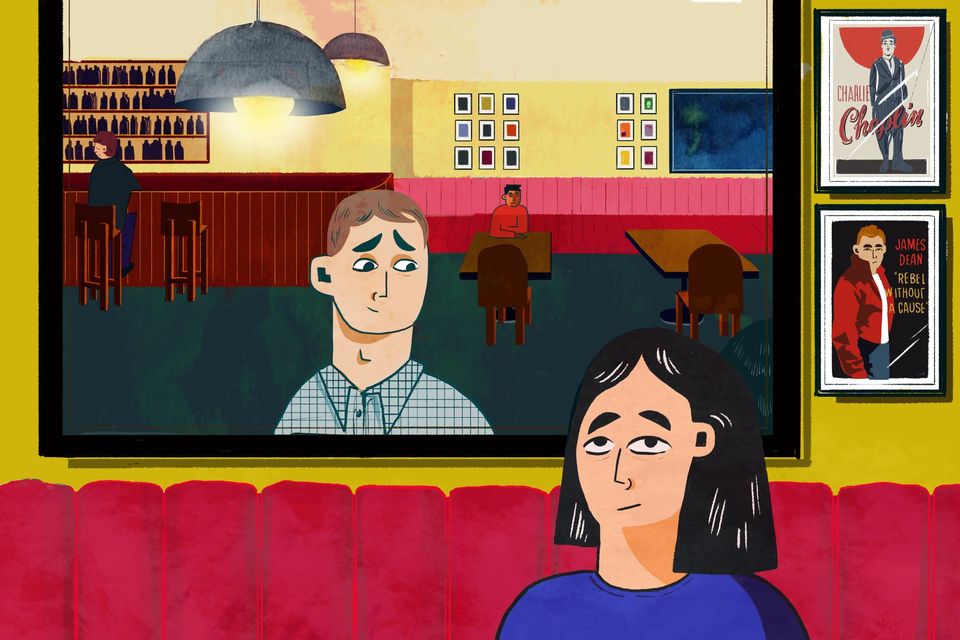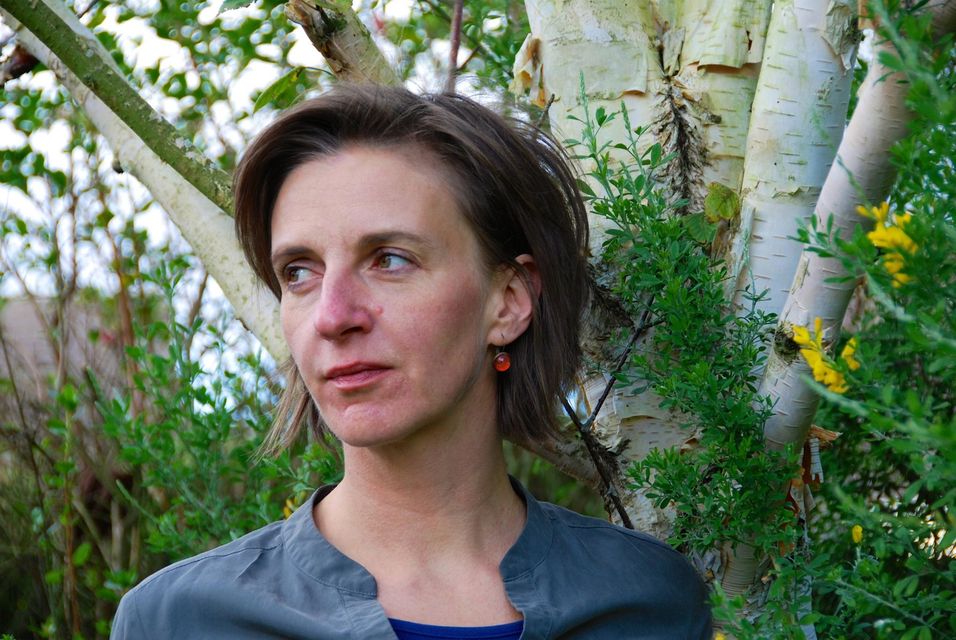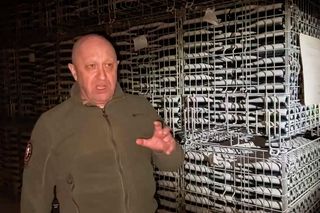New Irish Writing: Tibetans by Susanne Stich
June’s winning story
Illustration by Emily Mason
Last October, at our first meeting, he was late, apologised and sank into the seat beside me. I’d arrived early and waited for him on a red velvet bench below a mirror and two framed posters, Charlie Chaplin and James Dean, my heart pounding as I watched other men enter. Then, finally, him.
We’ve met once a fortnight since, Wednesdays, late afternoon, in the same bistro in Bleibtreustraße. It’s central, easy to get to for both of us. At the end of November he reached for my hand, and I pulled it away. He hasn’t tried again since. At Christmas our schedules clashed, and we skipped our meeting. We postponed another date in February when he recorded an audiobook about trees.
“It pays the bills,” he explained the next time.
“It’s good that it’s about trees,” I said.
He always tries to smile at me. I’m still not sure what his smile means when it’s the two of us surrounded by mirrors and posters. I’ve seen pictures of him smiling online, in film and stage stills, attending award ceremonies, the launch of an initiative for young actors, where his hair was cropped short. There are video clips, too, including one in which he speaks English. He isn’t famous, so there aren’t many. Overall, I wouldn’t describe him as a smiley man. He’s tall, neither thin nor fat, a furrow in his brow, deep creases between nose and mouth, his hair colour, depending on the light, something between brown and grey. I think his eyes are green, but I couldn’t be sure. Part of me still doesn’t want to remember too much.
Some time in March he talked about a thing he’d started doing in the morning. He promised to email me a PDF the same night, The Five Tibetan Rites — An Illustrated Guide. He didn’t forget, but he didn’t sign the email. I suspect he didn’t know how. I printed the file and put it up on my wall, the small, androgynous stick-figures demonstrating the movements.
“I found it online,” I lied to my roommates when they asked about it.
I lie a lot. Not as much as him maybe. But how would I know?
In the small Bavarian town I grew up in I crossed a river on my way to school, a wooden bridge over bottle-green water. There always were ducks, drifting with the current or gathering along the banks. You heard them before you saw them. Sometimes my mother gave me bags with pieces of old bread to feed to them. Throwing the bread into the water I thought of him, wanting to be where he was as badly as those ducks were trying to get at the bread.
The fact that we’re now in the same city, it bothered my mother at the start. I told her it wasn’t because of him I wanted to go, and part of me believed it. I was still lying of course.
“Everybody goes to Berlin,” I said.
I’ve been here 10 months now, enrolled at the university, but I don’t attend many lectures. I hang out in the city. I’ve made friends. Many of them detest men his age. I don’t tell them much about that part of my life. They hug me late at night when we’re drunk and cry about the state of the world.
When I was little, he was a secret I didn’t mind keeping. I’m only getting used to the fact that I don’t need to any more. When we meet, I tell him all sorts of inconsequential truths, mostly to hear myself speak honestly, and for a while, after we first sit down in our corner in Bleibtreustraße, it’s as if whatever I say gives him some kind of joy. Truth or not. The choice is mine, and I enjoy practising.
“Just like you I’ve had long hair and short hair,” I told him in early April. Truth.
He isn’t rich, and we weren’t poor. Ours isn’t that kind of story. Even if he did send us money. He remembered my birthdays. Parcels arrived at Christmas. No personal messages, though. Twenty-one years ago I was an accident in Ireland. He had a part in a movie for German television based on an English novel. The actors had to pretend they were in Devon. My mother was the production assistant. They fell for each other when he shouldn’t have. Pregnant with me, my mother moved back to the town she grew up in. In the beginning, she hoped to work in film again. She never did. These days she works in the town hall, organising cultural events. Sometimes she speaks to actors as part of her work, but never to him. She lives for the weekends when she goes hiking with a group. I’d swear there isn’t a mountain in the Bavarian Alps she doesn’t know. When he returned to his wife and young son all those years ago, she told him not to worry about us.
“Did you really say that?” I’ve asked her many times.
“Yes,” she answered, not once giving a reason.
The day he later sent the PDF he also informed me that his marriage was finally over.
“It’s because of me, isn’t it?” I said.
“No.”
He’d told his wife and son about me, but no. When I made contact in October, he’d already been on the verge of moving out.
“You’re the straw that broke the camel’s back.”
He looked glum when he told me this, but he tried to smile, even then.
These days he wants to know all kinds of things, how school was for me, down south, what books I liked as a child and what I watched on TV, why I don’t speak with a Bavarian accent. Sometimes he shows me photos. His wife looks a little like my mother. Different hair, similar features. I feel sorry for them both. I feel sorry for him, too. I haven’t met my brother.
“Not yet, he tells me in late April.
He says he still finds it easy to imagine things, although he’s never had a big break.
“It’ll come,” I say.
I can tell he likes the idea. He’s trying to construct something new, like the house he’s never built. His father was a stonemason, hoping his son might follow in his footsteps.
When he finishes a sentence, he often keeps looking at me. I then wake up in the middle of the night and there’s this feeling that he’s still watching me. I don’t tell anyone. He and I, it’s as if we’re in a vacuum. There isn’t much air for us in the world right now. There are people who’d rather I hate him, myself included sometimes. Maybe that’s why we focus on breathing in these exercises.
“They’re not exercises. They’re rites,” he corrects me when I finally tell him that I’ve started doing them too.
I’m hurt. It happens easily. I lean back in my seat.
“Sorry. That was a bit abrupt.”
I pretend it doesn’t matter. He doesn’t know of course that I’m practising these rites because I, too, am catching up on things. I haven’t told him about the other men his age, the phase toward the end of school when I took trains to Munich at the weekends while my mother was away hiking. I met these men in cafés, places not unlike the bistro. Afterwards I went with them for a while. Once I’d started looking, they showed up everywhere. It was insane. Suddenly I, too, acted a part, didn’t recognise myself in the mirror. It wasn’t a great time for conversations with my mother. I could tell she suspected something, tried to talk to me more. I still went back to Munich, lying that I wanted to look at the art there. It was one big hole I’d climbed into. I couldn’t help myself. We had lived without him, always, my mother establishing the rules, and me playing along. Externally, all was the same. For a while it didn’t strike me that I was the one who’d changed. I took those trains instead, made those men my oxygen, until one afternoon, waiting for the train home, I started to cry on the station platform. An old woman sat down beside me and looked at me. I didn’t mind that she was there. Two pigeons appeared, fighting over breadcrumbs.
“It’ll be fine, dear,” she said, “when you cry, you’re breaking a spell.”
She briefly held my hand. I didn’t pull it away, and when the train arrived, we sat in different compartments. I never saw her again, but when I went to school the following Monday I focused on my exams. Staying put in our flat, I made all kinds of decisions, and when I finished school, while my mother didn’t want me to go to Berlin, she knew better than to stop me.
After the meetings in Bleibtreustraße there are days when I cry like I did on that platform. What we do — sit, talk and look at each other — in our case it’s never enough. I still like the word ‘rites’. It puts us in context, a context of significance. He says he isn’t religious. I say I’m not either, even though my mother took me to church at Christmas and Easter.
The last night of April I find myself in the mountains. Regardless of time and how it treats people, their fury leaving imprints on the rock, prayer flags sway in the wind. There are locals wearing colourful clothes. When I finally spot him, a solitary walker like me, I want to tell it all, the anger and sadness and disbelief. But he’s too far away to hear me. We stand at the opposite ends of a rope bridge, its railing low, a storm brewing. A gorge below us, this is no place to meet in the middle. One of us needs to stay put. He shouts that he will come to me, the opposite of what I expect. I want to close my eyes, and yet, if there is one thing I must do, it’s to watch him approach, the trees behind him still the same size. There’s no way of telling whether he’ll make it safely across. It could take all his life, and all of mine.
I wake up in a sweat. The next day we’re back in Bleibtreustraße.
Sometimes he guesses at the things I was up to before Berlin. He isn’t bad. In June I finally tell him.
“And why wouldn’t you have gone with these men? There was a gap in your life that needed filled. Makes sense.”
His only comment. It echoes through me like a scream in the mountains I dreamed of. The truth, but not enough of it. I hate him for saying it. I experienced all that mess on my own. That, and so much more.
“I was lucky,” I say after a period of silence, “lucky that I stopped. Lucky to emerge on the other side.”
He’s heard me, hesitates, eventually nods, and this time I don’t pull my hand away.
We are what we are. Tibetans, breathing, at the crack of dawn. For now, with all the light this time of year, it’s a way to describe us. I’m beginning to understand something.
Ours is a big project. Hoping for love when there’s nothing to fall back on, but your body tells you: “Here’s your chance.” To breathe and move. It sounds simple, but I’m easily distracted. Other people’s thoughts drift into mine like plastic bags in a breeze, when really, it’s about extending the inhale and the exhale, the space between, a spell of not breathing, the impossible within reach. To live and let live. Be his daughter.
Susanne Stich, the June winner of the New Irish Writing short story
How to enter
New Irish Writing, edited by Ciaran Carty and appearing in the Irish Independent on the last Saturday of each month, is open to writers who are Irish or resident in Ireland. Stories submitted should not exceed 2,000 words. Up to four poems may be submitted. There is no entry fee. Writers whose work is selected will receive €120 for fiction and €60 for poetry. You can email your entry, preferably as a Word document, to newirishwriting68@gmail.com. Please include your name, address and contact number, as well as a brief biographical paragraph. Only writers who have yet to publish their first book can be considered.










